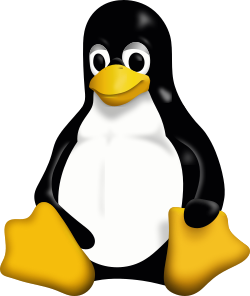| Linux | |
|---|---|
 | |
| Developer | GNU Project, Linus Torvalds and many others |
| Written in | Assembly language, C |
| OS family | Unix-like |
| Working state | Current |
| Source model | Free and open source software |
| Marketing target | Desktops, servers, embedded devices |
| Available in | Multilingual |
| Supported platforms | DEC Alpha, ARM, AVR32, Blackfin, ETRAX CRIS, FR-V, H8/300, Itanium, M32R, m68k, Microblaze, MIPS, MN103, PA-RISC, PowerPC, s390, S+core, SuperH, SPARC, TILE64, Unicore32, x86, Xtensa |
| Kernel type | Monolithic |
| Userland | GNU and others |
| Default user interface | Graphical (X Window System) and command-line interface |
| License | Various including GNU General Public License, BSD License, Apache License, MIT License, and others[2] |
| Official website | kernel.org |
Linux (commonly /[invalid input: 'icon']ˈlɪnəks/ LIN-əks in English,[3][4] also Template:Pron-en LIN-uuks[5] in Europe) refers to the family of Unix-like computer operating systems using the Linux kernel. Linux can be installed on a wide variety of computer hardware, ranging from mobile phones, tablet computers, routers, and video game consoles, to mainframes and supercomputers.[6][7][8][9] Linux is a leading server operating system, and runs the 10 fastest supercomputers in the world.[10]
A 2001 study of Red Hat Linux 7.1 found that this distribution contained 30 million source lines of code.[11] Using the Constructive Cost Model, the study estimated that this distribution required about eight thousand man-years of development time. According to the study, if all this software had been developed by conventional proprietary means, it would have cost about $1.97 billion (2025 US dollars) to develop in the United States.[11]
- ^ Linux Online (2008). "Linux Logos and Mascots". Retrieved 2009-08-11.
- ^ "Debian GNU/Linux Licenses – Ohloh". ohloh.net. Retrieved 2009-03-27.
- ^ Safalra (2007-04-14). "Pronunciation of 'Linux'". Safalra’s Website. Retrieved 2009-09-15.
- ^ Free On-Line Dictionary of Computing (2006). "Linux". Retrieved 2009-09-15.
{{cite web}}: Unknown parameter|month=ignored (help) - ^ Torvalds used /[invalid input: 'icon']ˈlɪnʊks/ in English.
"Re: How to pronounce "Linux"?". 23 April 1992. 1992Apr23.123216.22024@klaava.Helsinki.FI.{{cite newsgroup}}:|access-date=requires|url=(help); Unknown parameter|newsgroups=ignored (help)
Torvalds recorded himself pronouncing the name during the 1990s. (/ˈlɪnʊks/: "How to pronounce Linux?". Retrieved 2006-12-17.) and in Swedish (/ˈlɪːnɤks/: "Linus pronouncing Linux in English and Swedish". Retrieved 2007-01-20.) - ^ IBM (2001). "Linux Watch". Retrieved 2009-09-29.
{{cite web}}: Unknown parameter|month=ignored (help) - ^ Linux Devices (2010). "Trolltech rolls "complete" Linux smartphone stack". Retrieved 2009-09-29.
{{cite web}}: Unknown parameter|month=ignored (help) - ^ Computerworld, Patrick Thibodeau. "IBM's newest mainframe is all Linux". Retrieved 2009-02-22.
- ^ Lyons, Daniel. "Linux rules supercomputers". Forbes. Retrieved 2007-02-22.
- ^ Henry Burkhardt, KSR. "June 2010 | TOP500 Supercomputing Sites". Top500.org. Retrieved 2010-10-30.
- ^ a b Wheeler, David A (2002-07-29). "More Than a Gigabuck: Estimating GNU/Linux's Size". Retrieved 2006-05-11.